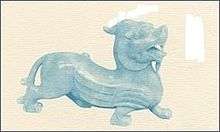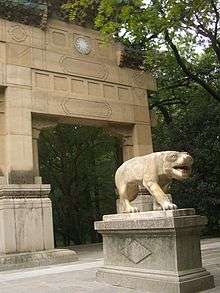Pixiu
| Pixiu | |||||||||||
 Pixiu | |||||||||||
| Chinese | 貔貅 | ||||||||||
|---|---|---|---|---|---|---|---|---|---|---|---|
| |||||||||||
| Alternative Chinese name | |||||||||||
| Chinese | 辟邪 | ||||||||||
| Literal meaning | to ward off evil spirits | ||||||||||
| |||||||||||
Pixiu or Pi Yao (Chinese: 貔貅; pinyin: píxiū, Wade-Giles: P'i-hsiu), originally known as Bixie (Chinese: 辟邪; pinyin: bìxié; "to ward off evil spirits"), is a Chinese mythical hybrid creature considered to be a very powerful protector to practitioners of Feng Shui.[1] It resembles a winged lion. Pixiu is an earth and sea variation, particularly an influential and auspicious creature for wealth. It is said to have a voracious appetite towards only gold and silver. Therefore, traditionally to the Chinese, Pixiu has always been regarded as an auspicious creature that possessed mystical power capable of drawing Cai Qi (財氣 wealth) from all directions.[2][3] Thus, it is helpful for those who are going through a bad year according to Chinese zodiac.
There are two different types of Pixiu. The difference is with their horns. The one with two horns is known as Pi Ya (possibly a corruption from pi xie (辟邪)) and the one with one horn is called Tian Lu (天祿) (Pi Chen).
- Tian Lu (天祿) - is in charge of wealth. Displaying Tian Lu at home or in the office is said to prevent wealth from flowing away.
- Pi Ya - wards off evil. It is also believed that Pi Ya has the ability of assisting anyone who is suffering from bad Feng Shui that is due to having offended the Grand Duke Jupiter (also called as Tai Sui (太岁)).
Pixiu craves the smell of gold and silver and it likes to bring his master money in his mouth. Statues of this creature are often used to attract wealth in feng shui.
Today, Pixiu is also a popular design on jade pendants.
Characteristics

Fierce looking and covered with whitish-grey fur, Pixiu has the head of a Chinese dragon, but is commonly depicted with only one antler as time passes. Ancient Chinese depictions of Pixiu show the male with the single antler, and the female with two. As with the Chinese Phoenix, the common image today is a representation of a single sex. Pixiu has protruding eyes and sharp teeth. Its body resembles a Chinese lion and the legs of Pixiu are those of a qilin. Looking at the posture of the Pixiu, the creature seems to project a sense of strength, elegance and mobility. Its obvious characteristic is its fat body to indicate a full stomach loaded with unlimited amounts of good fortune. It has a single horn on its head and a pair of wings. Likewise it has a big opened mouth ready to gobble up fortune. because of this, a Pixiu statue is often employed in the home as a way of receiving and keeping fortune.
It is believed that the common wingless Pixiu assists in seeking wealth while a winged Pixiu assists students in furthering their studies.
Due to their similar appearances, the Pixiu is often confused with fu Dogs or qilin.
Mythology

The myth of Pixiu tells that the creature violated a law of heaven by defecating on the floor, so the Jade Emperor punished it by restricting the Pixiu's diet to gold and sealing its anus. Thus, pixiu can only absorb gold, but cannot expel it. This is the origin of Pixiu's status as a symbol of the acquisition and preservation of wealth.
Pixiu is also a fierce creature. The large fangs visible in the creature's mouth are used to attack demons and evil spirits, draining their essence and converting it to wealth. Pixiu also guards against disease caused by these same evil spirits.
In tribute to Pixiu's ferocity and prowess in battle, the Pixiu was synonymous with the army in ancient China.
Feng Shui
Pi Yao is the heavenly variation of a particularly powerful and auspicious creature of good fortune. He is said to have the power to assist anyone suffering from bad Feng Shui due to having offended the Grand Duke Jupiter (Tai Sui). In 2005, the Grand Duke resided in the West, so those born in the year of the Rabbit will have been in conflict with him. Practitioners of Feng Shui should ensure that they display the Pi Yao in the West to appease Tai Sui. The Pi Yao should also be displayed in homes for those enduring a period of bad luck soon after moving into a new home or soon after undertaking renovations. In 2006, Tai Sui moved to the Northwest. His exact position in 2006 is West-Northwest.
During China's history, Pixiu were commonly displayed in ancient architecture to ward off Yin Qi (陰氣) and to harness auspicious Qi. The statues of a Pixiu are commonly found on the four corners of the roofs of houses—usually houses of important people such as the emperor. The Pixiu is lined 5th, behind the dragon, phoenix, winged horse and sea horse. In ancient China, statues of Pixiu were also used as tomb guardians.
- Pi Ya - must be placed facing out of the house. Displaying Pi Ya at the affected area of the house or office can avoid misfortune and disasters. For displaying towards openings or entrance, a pair of Pi Ya is needed.
- Tian Lu - for attracting wealth, one may place it at the desired wealth area such as attractive wealth area or accumulative wealth area. Do not place Tian Lu facing directly on any person like a confronting position. Ideally, Tien Lu should not be place on the floor but it should never be place above eye level.
One cannot touch the mouth of the "Pixiu," because the touching its mouth would ruin the wealth.
See also
References and footnotes
External links
| Wikimedia Commons has media related to Pixiu. |